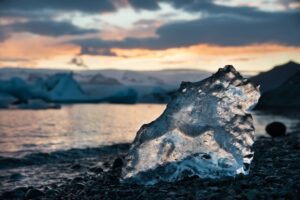Physical Address
23,24,25 & 26, 2nd Floor, Software Technology Park India, Opp: Garware Stadium,MIDC, Chikalthana, Aurangabad, Maharashtra – 431001 India
Physical Address
23,24,25 & 26, 2nd Floor, Software Technology Park India, Opp: Garware Stadium,MIDC, Chikalthana, Aurangabad, Maharashtra – 431001 India

The Arctic, one of the most fragile regions on Earth, is undergoing an extraordinary climatic shift. Scientists have recorded temperatures at the North Pole soaring more than 20°C above average, reaching levels beyond the melting point of ice. This rare and dramatic spike in warmth has sparked serious concerns among researchers about the accelerating pace of climate change and its cascading effects on polar ice, global weather patterns, and rising sea levels.
Record-Breaking Temperatures Observed
On Sunday, temperatures in areas north of Svalbard, Norway, were nearly 18°C higher than the 1991-2020 average, with some regions approaching 0°C—the point where ice begins to melt. By Monday, the temperature anomaly had exceeded 20°C, making it one of the most extreme warming events recorded in the Arctic during winter.
Mika Rantanen, a scientist at the Finnish Meteorological Institute, described the phenomenon as “a very extreme winter warming event.” He noted that while such temperature surges have occurred before, this one is at the “upper edge of what can happen in the Arctic.” This abrupt heating is driven mainly by a deep low-pressure system over Iceland, which directs an intense warm air flow toward the North Pole.
Julien Nicolas, a researcher at the EU’s Copernicus Climate Change Service, pointed out that warm ocean temperatures in the northeast Atlantic played a role in amplifying the effect. He noted that while such occurrences are unusual, similar conditions were observed in February 2018, further demonstrating the growing frequency of these extreme Arctic events.
Implications for Arctic Ice and Global Climate
Since 1979, the Arctic has been warming nearly four times faster than the global average. Scientists warn that when temperatures rise above freezing in the region, they accelerate ice melt, creating a cycle that further fuels climate instability. Ice reflects sunlight, but the darker ocean absorbs more heat when it melts, worsening the warming trend.
Dirk Notz, a climate scientist at the University of Hamburg, emphasised that “there is no negotiating with this fact, and no negotiating with the fact that the ice will disappear more and more as long as temperatures keep rising.” His research highlights how Arctic sea ice is already in irreversible decline. Summer ice is expected to vanish within two decades, even if emissions are significantly reduced.
A study co-authored by Notz projected that the loss of Arctic sea ice will continue regardless of mitigation efforts. He stressed that this will be “the first landscape to disappear because of human activities,” highlighting the immense impact of human-driven climate change.
Call to Action
The dramatic rise in Arctic temperatures is not just a local crisis—it has global consequences. As polar ice continues to decline, it contributes to rising sea levels, alters ocean currents, and disrupts the weather systems that millions depend on. The warming Arctic could lead to extreme heatwaves, storms, and shifting precipitation patterns worldwide.
Scientists warn that extreme warming events will become more frequent and intense unless immediate action is taken to reduce greenhouse gas emissions. The Arctic is often considered a warning sign for the rest of the planet—what happens today could shape global climate stability’s future.
As the world faces this growing crisis, the choices made now will determine whether the Arctic remains frozen or continues its rapid transformation. The time for action is not in the future—it is now.
The Arctic has warmed ‘nearly four times faster’ than the global average
https://www.nature.com/articles/s41467-023-38511-8
Banner image:
Photo by Joseph Vary on Unsplash